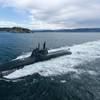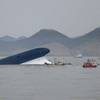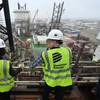IMO Safety Committee, Piracy on Agenda
IMO's Maritime Safety Committee (MSC) is meeting at the Organization's London Headquarters for its 86th session from 27 May to 5 June.
The packed agenda includes discussion on piracy and armed robbery against ships off the coast of Somalia and in the Gulf of Aden, the implementation of the Long-Range Identification and Tracking (LRIT) system, the development of goal-based standards for new ship construction and the adoption of amendments to the International Convention for the Safety of Life at Sea (SOLAS).
The MSC will review the latest statistics on piracy and armed robbery against ships, in particular in relation to the situation off the coast of Somalia and in the Gulf of Aden, where ships continue to be attacked and hijacked, despite the concerted efforts of the international community, spearheaded by IMO, navies and the industry, to protect shipping.
The MSC is expected to finalize updated Recommendations to Governments for preventing and suppressing piracy and armed robbery against ships; and Guidance to shipowners and ship operators, shipmasters and crews on preventing and suppressing acts of piracy and armed robbery against ships, taking into account the current trends and practices of the perpetrators with a view to providing advice in cases where seafarers, fishermen and other mariners are kidnapped or held hostage for ransom; and providing advice in cases where naval vessels and military aircraft seek to provide assistance or protection.
A special briefing from those involved in operations to deter and repress acts of piracy and armed robbery against ships off the coast of Somalia, as well as from those affected by the situation, including industry representatives, will be held on Wednesday, 27 May at 4.30. p.m.
The MSC will be updated on the implementation status of the LRIT system and will consider the outcome of the seventh session of the Ad Hoc LRIT Group, which met in March.
The MSC is expected to approve international goal-based ship construction standards for bulk carriers and oil tankers, together with proposed amendments to SOLAS Chapter II-1 making their application mandatory.
The MSC will also consider draft Guidelines for verification of conformity with goal-based ship construction standards for bulk carriers and oil tankers and draft Guidelines for the information to be included in a Ship Construction File.
The proposed SOLAS regulation II-1/3-10 on Goal-based ship construction standards for bulk carriers and oil tankers would apply to oil tankers and bulk carriers of 150 m in length and above. It would require new ships to be designed and constructed for a specified design life and to be safe and environmentally friendly, in intact and specified damage conditions, throughout their life. The ship should have adequate strength, integrity and stability to minimize the risk of loss of the ship or pollution to the marine environment due to structural failure, including collapse, resulting in flooding or loss of watertight integrity.
The goal-based standards have been developed on the basis of a five-tier system, consisting of goals (Tier I), functional requirements (Tier II), verification of conformity (Tier III), rules and regulations for ship design and construction (Tier IV) and industry practices and standards (Tier V). The proposed goal-based standards reflect tiers I to III.
Draft amendments to SOLAS regulation V/19, to make mandatory the carriage of Electronic Chart Display and Information Systems (ECDIS) and Bridge Navigational Watch Alarm Systems (BNWAS), under SOLAS chapter V Safety of Navigation, will be considered for adoption. The requirements will be mandatory for new ships and phased in for existing ships.
Other draft SOLAS amendments for adoption include:
• an amendment to SOLAS regulation II-1/3-5.2, to prohibit all new installations of asbestos on board ships, without exceptions; and
• amendments to the title of Chapter VI to read Carriage of Cargoes "and Oil Fuels" and to Regulation VI/5-1 on Material safety data sheets (MSDS) to require MSDS to be provided for ships carrying oil or oil fuel, prior to the loading of such oil as cargo in bulk or bunkering of oil fuel. The MSC will also consider draft Recommendations for material safety data sheets (MSDS) for MARPOL Annex I type cargoes and oil fuels.
The MSC is expected to review Member States' experience with implementing MSC.1/Circ.1192 Guidance on voluntary self-assessment by SOLAS Contracting Governments and by port facilities and MSC.1/Circ.1194, which includes Guidance on basic elements of national oversight programmes for SOLAS chapter XI-2 and the ISPS Code.
The MSC will be invited to approve, in principle, the preliminary draft revised text of the International Convention on Standards of Training, Certification and Watchkeeping for Seafarers (STCW) 1978, as amended, and the STCW Code, prepared by the Sub-Committee on Standards of Training and Watchkeeping (STW).
The Committee will also be invited to authorize an ad hoc intersessional meeting of an STW working group to progress the work, with a view to finalization at STW 41 in February 2010. STW 41 would then finalize the draft text of amendments to the STCW Convention and Code, with a view to their circulation by the Secretary-General for consideration by a Diplomatic Conference, scheduled for mid-2010.
The list of Parties deemed to be giving full and complete effect to the provisions of the International Convention on Standards of Training, Certification and Watchkeeping for Seafarers (STCW) 1978, as amended, is expected to be updated when the Secretary-General submits his report on those countries of which independent evaluations have been completed since the previous MSC meeting.
The draft Code for the Construction and Equipment of Mobile Offshore Drilling Units, 2009, which revises and updates the MODU Code adopted in 1989 (resolution A.649(16)), will be considered for approval, prior to submission to the IMO Assembly for adoption.
The MODU Code provides an international standard for mobile offshore drilling units of new construction, to facilitate the international movement and operation of these units and ensure a level of safety for such units, and for personnel on board, equivalent to that required by the SOLAS Convention and the 1988 Protocol to the Load Lines Convention for conventional ships engaged on international voyages.
The draft Code on Alerts and Indicators, 2009 will be considered for approval by the MSC and the Marine Environment Protection Committee (MEPC), for submission to the IMO Assembly for adoption.
The Code is intended to provide general design guidance and to promote uniformity of type, location and priority for alerts and indicators required by the SOLAS Convention, including relevant performance standards, and by the MARPOL Convention, as well as by other associated instruments and codes. The Code, when adopted, will update, revise and replace the Code on Alarms and Indicators, 1995 (resolution A.830(19)).
The Formal Safety Assessment (FSA) Experts Group is expected to be established as a working group to review comprehensive safety studies on cruise ships, ro-ro passenger ferries, liquefied natural gas carriers and containerships, which have been carried out within the research project SAFEDOR and have been previously submitted to the MSC.
FSA experts, nominated by Member States and international organizations, will thoroughly review these studies, with a view to advising on whether the methodology was applied in accordance with IMO guidelines and providing recommendations on any future action for consideration by the Committee. The risk-based methodology known as FSA has become an important tool for use in the IMO rule-making process.
The MSC will consider the need for capacity-building related to the implementation of new, and amendments to existing, instruments. A correspondence group has developed a procedure for evaluating the implications of capacity-building requirements and a checklist of issues requiring special focus, when examining what capacity-building may be needed for the implementation of new measures, for consideration.
The MSC will consider other issues arising from the reports of Sub-Committees and other bodies, including the approval of:
• the draft revised Joint IMO/IHO/WMO Manual on Maritime Safety Information (MSI);
• the draft revised International Code for Application of Fire Test Procedures (FTP Code);
• draft Guidelines for the drainage of fire-fighting water from closed vehicle and ro-ro spaces and special category spaces for passenger and cargo ships;
• draft Interim Guidelines on safety for gas-fuelled engine installations in ships; and
• draft revised Guidelines for ships operating in ice-covered waters, for concurrent approval by MEPC 59 and subsequent adoption by the Assembly.
IMO - the International Maritime Organization - is the United Nations specialized agency with responsibility for the safety and security of shipping and the prevention of marine pollution by ships.













